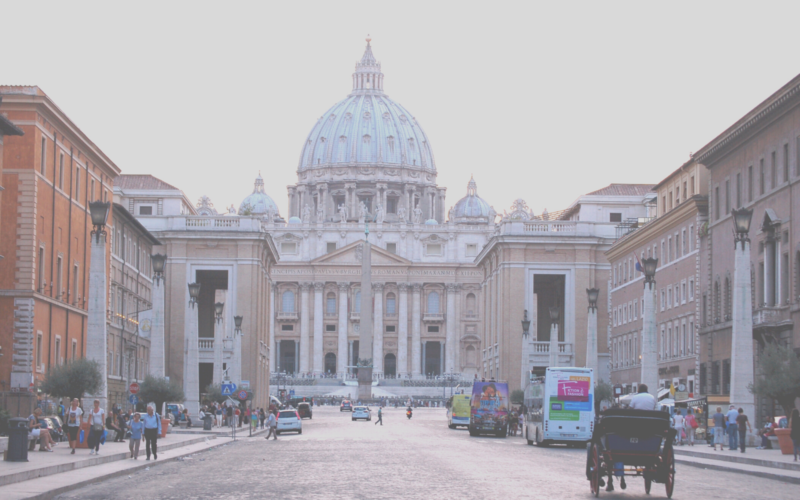I want to introduce you to someone: Let’s call her Maria. Maria’s anxiety levels have been through-the-roof lately. Due to the pandemic, her husband lost his job. Her kids haven’t been able to go to school, and they are chafing against the stay-at-home order. It’s been a struggle to get basic necessities. Some of her friends and acquaintances have contracted the virus, and she’s afraid of what will happen if she gets sick. Suddenly, the certainty of death and the uncertainty of when it will reach her feels like an anvil on her chest. She’s struggling to make sense of it all. Unable to leave home until the government order is lifted, she sits down at her computer to search for answers, hope, and meaning on the Internet.
Depending on her religious background and what part of the world she’s from, maybe she’ll turn to the Vatican to hear what the pope has to say. If so, she’ll be taught that the catastrophes and suffering the world is experiencing are an opportunity for “conversion” and repentance—but not a conversion from the kingdom of darkness to the kingdom of light, or a repentance from sin against God. Instead, it’s a chance to repent of her misuse of the planet’s resources. The suffering she’s experiencing is a message telling her to slow down her rate of consumption and to reconnect with nature. [1]
During a time when so many families around the world are confined to their homes, we’re seeing more people than ever before flocking online, desperately searching for the truth. Maybe she’s from a part of the world that is dominated by the Word of Faith movement and the prosperity gospel. Even though the faith healers seem unable to do anything to curb the global pandemic, they’re still confidently asserting that God’s will for His children is to experience health and wholeness. [2] If you just have enough faith, they imply, you can avoid suffering altogether.
Maybe she’s inclined to look for answers within Buddhism, comforted by the belief that at least there’s no such thing as permanent suffering. [3]
Or maybe she’s convinced that—from a secular, materialistic point of view—there is no answer to be found. Everything is essentially meaningless. Suffering only has a purpose if she gives it one. [4]
We want Maria to know the truth.
Suffering is meaningful, and the danger of permanent, eternal suffering is devastatingly real. But there is also real hope to be found. Despite the array of “options” she might find on the Internet, there is only one way for Maria to find that hope: the Lord Jesus Christ, who said, “I am the way, and the truth, and the life; no one comes to the Father but through Me” (John 14:6).
If Maria calls on the name of the Lord, she will be saved (Rom. 10:13). But how will she call on Him unless she believes Him? How will she believe Him unless she’s heard Him? How can she hear Him unless His Word is preached to her (Rom. 10:14)? Biblically called and qualified preachers are vital to the dissemination of God’s truth. That’s why TMAI is committed to training men to accurately proclaim the Scripture—so that people like Maria might hear the only message that brings true comfort, hope, and eternal life.
During a time when so many families around the world are confined to their homes, we’re seeing more people than ever before flocking online, desperately searching for the truth. Thanks to the support of friends like you, thousands of TMAI students and graduates are preaching the Word of God online during this pandemic, reaching even more people than usual. Amid the cacophony of false gospels and human wisdom, TMAI’s graduates are strategically positioned all around the world to proclaim the true gospel to their individual contexts and communities. By God’s grace, they’re teaching what the Bible says about health, suffering, and our purpose here on earth—reaching people like Maria with the words of eternal life.
Please pray for our students and graduates who are preaching and ministering to their congregations during this time. And consider joining us as we continue to train preachers who will bring God’s Word to the world.
- Ivereigh, Austen. “An Interview with Pope Francis,” April 8, 2020. https://www.commonwealmagazine.org/time-great-uncertainty (accessed May 7, 2020).
- Hinn, Benny. “God’s Will Is Your Health,” https://www.bennyhinn.org (accessed April 21, 2020).
- Dalai Lama [Tenzin Gyatso]. “Prayer is Not Enough,” TIME, April 14, 2020. https://time.com/5820613/dalai-lama-coronavirus-compassion (accessed May 1, 2020).
- Asma, Stephen T. “Does the Pandemic Have a Purpose?” New York Times, November 7, 2007. https://www.nytimes.com/2020/04/16/opinion/covid-philosophy.html (accessed May 1, 2020).

